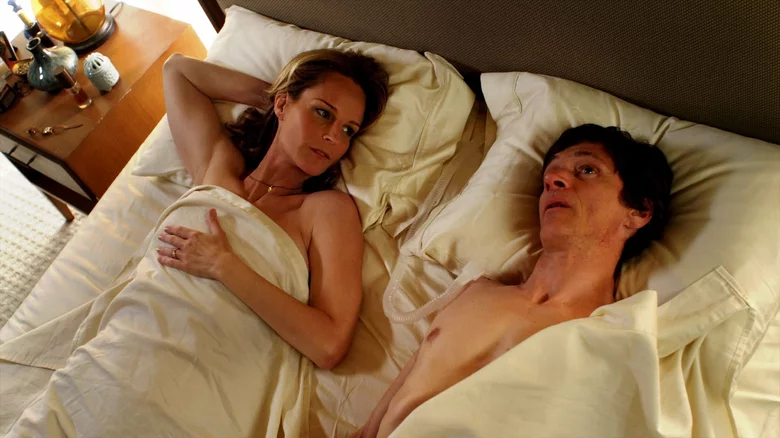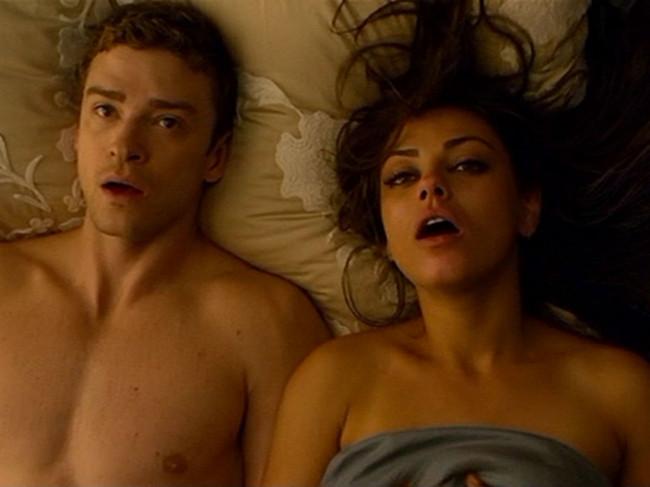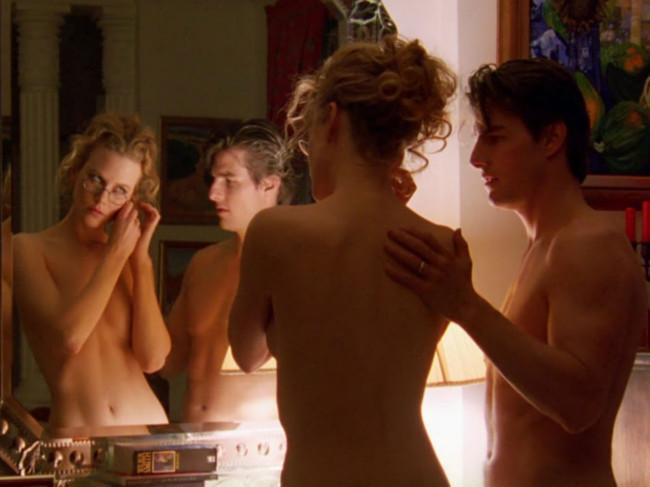Three or four times a year, a particular, tired old chestnut arises on social media: Are sex scenes ... necessary to movies? The discussion often follows several, well-worn points about how sex scenes rarely contribute to a film's story, or that they interrupt vital drama or action. On-screen coitus is often argued as being a prurient little intermission in the middle of a film wherein the audience can enjoy (or, as the tone of the argument may dictate, endure) staring at nude bodies for a few moments before the story can pick up again. Sex, in these arguments, is seemingly deadweight. Ballast to pad out a running time. The "yada yada yada" of cinema.
Sex scenes, to put in perfectly bluntly, are not only necessary, but should be welcome with open arms.
The recent movement to eschew sex scenes appears to spring from a bizarre cultural internalization of the PG-13 rating. For the better part of the last 15 years, most of the most popular movies in the world have been bright, effects-heavy, four-quadrant-hitting action blockbusters with superheroes and/or Wookiees. Such films might feature attractive people, flirty looks, or moments of sexual tension, but few of them feature out-and-out sexual contact between characters. Additionally, these films tend to be very plot- and dialogue-heavy, leaving out moments of relaxation or silence in place of unending quips, "important" character moments, or outright exposition. When the plot does slow down, it's to accommodate a 30-minute chase or fight sequence. Readers may immediately note that there aren't movements to eschew fight scenes or chase scenes.
The Sucker Punch effect
Perhaps it's the breakneck pace of the modern blockbuster that has scared modern audiences away from intimacy. Action heroes are often placed in situations of constant movement. Stopping to boink is anathema to their quest of violence. A savvy filmgoer might have sensed the tide turning in 2011 with the release of Zack Snyder's horrendous action clunker "Sucker Punch," a film about young, exploited strippers who have been forced into sexual slavery by a sputtering would-be pimp (Oscar Isaac). In that film, the lead character Babydoll (Emily Browning) is one of the most erotic dancers to ever live. The audience, however, never sees her dancing, as Snyder cuts from Babydoll's dancing to an internal action dream narrative wherein she is a sword-wielding badass who murders armies of Nazis and androids. The sex is, in that film, literally replaced with fantasy violence. Films seem to have followed that model ever since.
So while it may be understandable why audiences weaned on fantasy violence may expect sex to be deliberately removed from their preferred stories, in doing so, many vital elements of the human condition are being deliberately excised. Audiences have reached a point that mainstream cinematic entertainments are largely sexless, and any tiny crumb of sexuality is savored. And while leaving most characters' sexualities abstract might provide a broader canvas for writers of slash fiction, it is, in many ways, a form of censorship. It also feeds into a widespread fear of sex and sexuality that has been deeply infecting an increasingly conservative discourse at large. Removing sex from movies is, in a vital way, removing it from everyday conversation. If people aren't sexual in movies, then they are only sexual in private. If they are only sexual in private, then they will be encouraged to be silent about sexual issues they may face. If they cannot talk about sexual issue, then sex once again becomes something oblique, shameful, and clandestine. Sex shouldn't be hidden from an adult audience. Human beings are sexual beings. Our art should reflect that.
Yes, necessary
Here are a few legitimate arguments as to why sex scenes are indeed necessary.
Firstly, it offers a release. Not just for the characters, but for the audience. Screenwriters are typically drawn to tales of sexual tension, but many PG-13 stories will not allow for the release of it beyond a kiss or, more chillingly, a mutual fight. Perhaps a brief moment of emotional vulnerability. A pair of previously uptight characters, seen in bed with each other, will communicate to each other and to the audience how cathartic sex can be. It's a bonding scene that brings characters closer together. In base screenwriting terms, these can be necessary character moments.
Secondly, it's a chance to "correct" porn. Although sex may often be left out of mainstream movies, pornography has only become more and more available online. What is rarely discussed, however, is that porn is often presented as a "perfect" version of human sexual contact. As sex advice columnist Dan Savage once described it, porn is the Kabuki Theater version of sex. In porn, performers are chosen for their perfect bodies or proportions, never have to deal with birth control, don't stop to giggle, don't converse in the middle of sex, don't communicate how a particular act may or may not be working. In depicting a real-world sex scene, a lot of the realities of sexual contact can be de-stigmatized. Audiences will see that it's not all wham-bam-thank-you-sir(s)-and-or-madam(s), but a sophisticated and pleasurable form of communication. A sex scene can have dramatic and humorous moment within it.
Imperfect sex
Thirdly, commonly seeing men and women experience sexual pleasure will certainly take the shame out of the equation. Sex can find someone at their most vulnerable, sometimes looking their silliest, feeling what might be a profound physical experience. If an audience sees a character in that position, it invites more understanding and more bonding dramatically, but also takes the stigma out of sexual pleasure. It's natural and fun, not something hidden off-camera.
Fourthly, not all sex is perfect, and more sex scenes would allow for a moment of embarrassed vulnerability wherein two partners can openly talk about how what they did might have been awkward or just a bad idea. The author can only call to mind one studio film that has ever had a "that was awkward, but now we can talk about it and still be friends" scene, and it was in Kay Cannon's vastly underrated 2018 sex comedy "Blockers." More positive conversations from negative experiences, please.
Fifthly, if there's no sex in films, then there's no gay sex in films. Queerness has long been a bugaboo of the MPA's rating system, and queer kisses have often received harsher ratings than heteronormative ones. Many companies have skirted the notion of including queer characters in their PG-13-rated entertainments by making everyone more or less sexless (although there are exceptions; America Chavez openly sports a pride pin in "Doctor Strange in the Multiverse of Madness"). Perhaps this is borne of paranoia, but I personally suspect that many calls to remove sex from feature films are using the argument as a Trojan Horse for homophobia. With all sexless figures, everyone can be imagined as straight, and there's suddenly no queer representation whatsoever. Hiding sex from movies is an aggressive act that forces queer people back into the celluloid closet. If audiences see more queer sex in movies, and it becomes common, fun, zesty, sexy, and playful, then the "curse" is taken off.
Pregnancy, abortion, human bodies
Sixthly, there is an unfortunately growing genre of road trip abortion movies, recently written about in the pages of /Film. This may blow the minds of some readers, but sex is how people become pregnant. Destigmatizing cinematic sex may — in an ironic twist — lead to a more open view and less sexualized view of human bodies. Audiences will still, of course, enjoy the base prurience of seeing nude people, but seeing people also deal with every elements of their sexual health can be folded into sexually frank movies. An honest and open depiction of safe sex, of pregnancy, may lead to a more open discussion of abortion, its necessity, and how common it is in the United States. A lot of sexual legislation seems geared toward punishing people for having sex and becoming pregnant. If sex were more openly discussed, if safe sex, pregnancy, and other common factors of everyday uterine health were in movies more, perhaps uptight lawmakers would be less gung-ho about more or less banning sex outside of procreation.
And finally, sex scenes are just fun. There is the simple fact that watching people have sex is a sexy time. It's perhaps telling that a recent linguistic quirk has led to audiences describing movies as "horny" ... and not themselves. The movie is the thing that is getting aroused. At the risk of sounding lascivious, it's okay to be horny. And it's okay to see a movie that makes you feel that way.
Making it ethically
This essay would not be complete without acknowledging some of the legitimate arguments against sex scenes, however. Apart from arguing against their "necessity," there are additional problems in modern filmmaking that might make filming a sex scene undesirable.
For one, many stories have floated to the surface over the years about how sex scenes are not always filmed ethically. Maria Schneider once talked about how she wasn't given the details of the famous butter scene in Bernardo Bertolucci's "Last Tango in Paris." Sharon Stone is on record on a how nude shot in "Basic Instinct" was shot without her consent. Those kinds of stories, especially hear in the post-#MeToo era, have audiences perhaps less comfortable with consuming sex on camera. In order to take the curse off, filmmakers may have to do press expressly talking about how everything was done consensually and ethically.
Celebrity skin
Another issue is that, thanks to sex scene compilation archives, any and all nude scenes can now be plucked out of their respective movies and be immediately re-contextualized as porn. An actor or actress may be convinced by a script or a filmmaker that the sex scenes in a movie are part of a larger, more complex narrative for a character, and can indeed show them as vulnerable and possessed of sexual agency. But as soon as those scenes are edited down by freelance would-be pornographers, all that context is gone. One might understand why performers would be reluctant to appear nude on camera, knowing that they will also appear on celebrity skin websites within minutes. Actors now have to be comfortable with that. Many aren't.
One last thing to consider is that the depiction of sexless characters in mainstream entertainments may be good representation for asexual people. Asexual people, as the moniker describes, aren't interested in sex, and a character who is also not interested in sex could serve as a reflection of their interests. It would, perhaps, be more useful if an asexual character bothered to describe themselves as such. "Hey, superhero, want to come back to my place for sexual activity?" "No, flirty person, I am asexual. If you want to share some cake, though, I'll be right there."
So, yes. Sex scenes do have issues that can be addressed. But including sex in movies is ultimately healthier, better, and definitely more fun than leaving it out. Indeed, let us no longer whinge and hand-wring about the necessity of nudity and sex. Let's put it back where it belongs: In the multiplex. In conversation. Out in the open. Nothing good comes from hiding it.







0 Comments